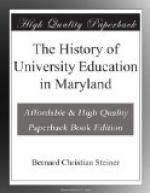We shall hope to secure a strong staff of young men, appointing them because they have twenty years before them; selecting them on evidence of their ability; increasing constantly their emoluments, and promoting them because of their merit to successive posts, as scholars, fellows, assistants, adjuncts, professors and university professors. This plan will give us an opportunity to introduce some of the features of the English fellowship and the German system of privat-docents; or in other words, to furnish positions where young men desirous of a university career may have a chance to begin, sure at least of a support while waiting for promotion.
Our plans begin but do not end here. As men of distinction, who have won the highest rank in their callings, are known to be free, we shall invite them to come among us.
If we would maintain a university, great freedom must be allowed both to teachers and scholars. This involves freedom of methods to be employed by the instructors on the one hand, and on the other, freedom of courses to be selected by the students.
But this freedom is based on laws,—two of which cannot be too distinctly or too often enunciated. A law which should govern the admission of pupils is this, that before they win this privilege they must have been matured by the long, preparatory discipline of superior teachers, and by the systematic, laborious, and persistent pursuit of fundamental knowledge; and a second law, which should govern the work of professors, is this, that with unselfish devotion to the discovery and advancement of truth and righteousness, they renounce all other preferment, so that, like the greatest of all teachers, they may promote the good of mankind.




